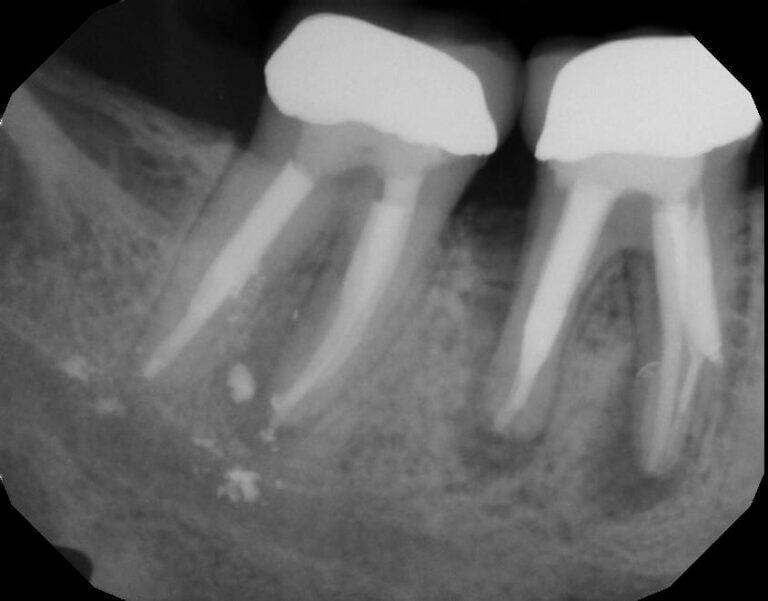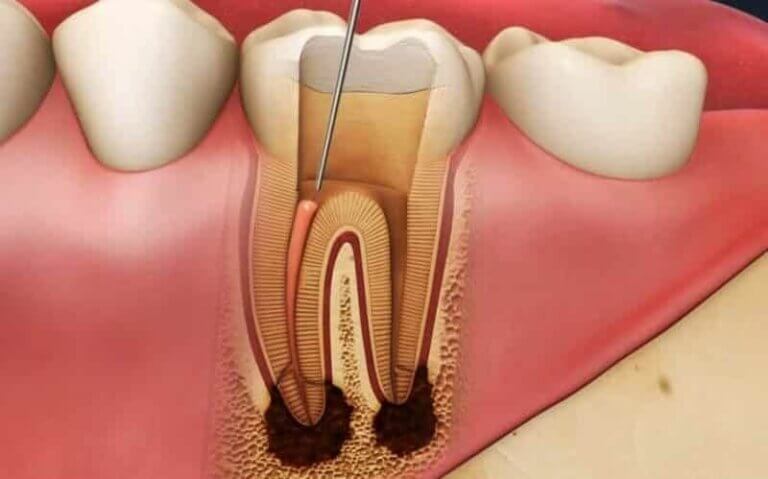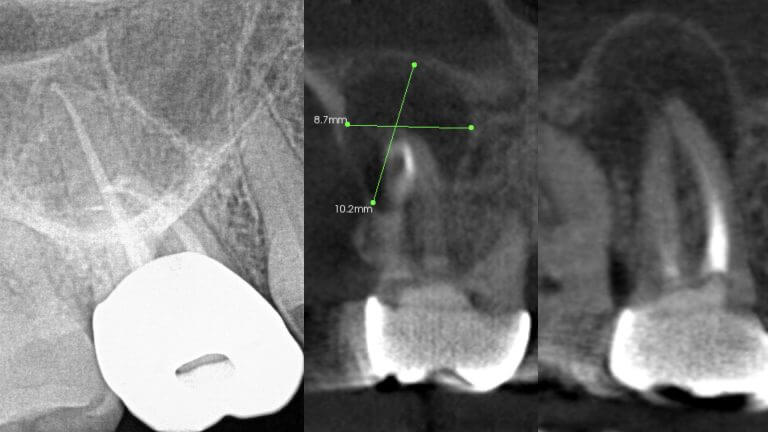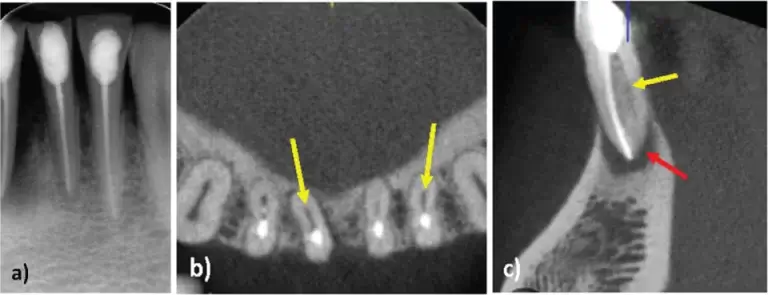CBCT Scan For Failed Root Canal

In the realm of modern dentistry, Cone Beam Computed Tomography (CBCT) has emerged as a powerful tool, offering dentists a detailed three-dimensional view of the oral structures. Root canal treatments, while commonly successful, can sometimes encounter complications leading to failure. In such cases, CBCT scans have become instrumental in precisely diagnosing the root of the problem, enabling dentists to devise effective strategies for remediation.
Before you deciding on whether a CBCT Scan for a Failed Root Canal is right for you, there are some things you should know:
Table of Contents
If you have any further questions about CBCT Scans at Oral Radiology Toronto, please contact us.
What Are CBCT Scans?
Cone Beam Computed Tomography (CBCT) is a revolutionary x-ray imaging technology, providing three-dimensional views of the patient’s dental anatomy, including teeth, bones, nerves, and surrounding tissues. Unlike traditional two-dimensional X-rays, CBCT captures high-resolution, cross-sectional images by utilizing a cone-shaped beam of ionizing radiation.
The result is a detailed and accurate representation that enables dental professionals to assess anatomical structures with precision, offering a more comprehensive understanding of the patient’s oral health. This wealth of information allows dental professionals to examine anatomical structures from multiple angles, facilitating accurate diagnosis, treatment planning, and evaluation of dental conditions, including failed root canal treatments.

What Is Failed Root Canal Treatment?
Failed root canal treatment, also known as endodontic treatment failure, occurs when a previously treated tooth does not heal as expected or develops complications after undergoing root canal therapy. Root canal treatment is typically performed to address infections or damage within the pulp of a tooth, where the nerves and blood vessels are located. During the procedure, the infected or damaged tissue is removed, the root canal system is thoroughly cleaned, and the space is filled and sealed to prevent further infection. However, various factors can contribute to the failure of this treatment, including inadequate cleaning and shaping of the root canals, incomplete removal of infected tissue, missed canals, undetected cracks or fractures in the tooth, bacterial leakage, or post-treatment infections. Failed root canal treatments can manifest through persistent pain, swelling, sensitivity to temperature, drainage, or the recurrence of infection. Identifying the underlying causes of treatment failure is crucial for determining the appropriate course of action to salvage the tooth and restore oral health effectively.
What Are Reasons For Failed Root Canal?
Failed root canal treatments can result from a variety of factors, ranging from procedural errors to inherent complexities within the tooth’s structure. Some common reasons for failed root canal treatments include:
- Inadequate cleaning and shaping: If the root canals are not thoroughly cleaned and shaped during the initial treatment, bacteria and infected tissue may persist, leading to continued infection and treatment failure.
- Missed canals: The intricate anatomy of teeth can sometimes conceal additional canals that may be missed during the initial treatment. If these canals are left untreated, they can harbor bacteria and cause infection.
- Undetected cracks or fractures: Cracks or fractures in the tooth can provide pathways for bacteria to enter the root canal system, leading to infection. These cracks may not always be visible on conventional X-rays and can go undetected without more advanced imaging techniques like CBCT scans.
- Incomplete removal of infected tissue: If infected tissue is not completely removed from the root canals, residual bacteria can continue to multiply and cause reinfection.
- Poor quality restoration: A poorly fitting or leaking dental restoration, such as a filling or crown, can allow bacteria to penetrate the tooth and compromise the success of the root canal treatment.
- Persistent infection: In some cases, the infection may be resistant to treatment or may recur due to factors such as compromised immune response or the presence of antibiotic-resistant bacteria.
- Fractured instruments: Instruments used during root canal treatment can break within the root canal, making it difficult to thoroughly clean and shape the canals, potentially leading to treatment failure.
- Patient-related factors: Poor oral hygiene, smoking, systemic health conditions, and inadequate post-treatment care can all contribute to the failure of root canal treatments by increasing the risk of infection or compromising the tooth’s ability to heal.
Identifying the specific reason for a failed root canal treatment is essential for determining the appropriate corrective measures and improving the chances of successful treatment outcomes.

Why Do I Need A CBCT Scan For Failed Root Canal?
CBCT scans play a crucial role in evaluating failed root canal treatments due to their ability to provide detailed three-dimensional images of the teeth and surrounding structures. Unlike conventional two-dimensional X-rays, CBCT scans offer comprehensive visualization that allows dentists to precisely assess the underlying reasons for treatment failure. Here’s why CBCT scans are indispensable in cases of failed root canal treatments:
- Detailed assessment of root canal anatomy: CBCT scans provide high-resolution images that enable dentists to thoroughly evaluate the root canal system, including identifying missed canals, complex canal configurations, and calcified canals that may have been overlooked during initial treatment. This detailed assessment helps ensure that all sources of infection are identified and addressed properly.
- Detection of fractures and cracks: Cracks or fractures in the tooth can be difficult to detect with conventional X-rays but are readily visible on CBCT scans. By identifying these structural defects, dentists can determine whether they contribute to the treatment failure and devise appropriate treatment strategies, such as tooth reinforcement or extraction if necessary.
- Assessment of periapical pathology: CBCT scans allow for accurate assessment of periapical lesions, such as abscesses, cysts, or granulomas, which may persist despite previous root canal treatment. By visualizing the extent and nature of these pathologies, dentists can determine the appropriate course of action, whether it involves further root canal therapy, surgical intervention, or tooth extraction.
- Evaluation of root canal filling quality: CBCT scans enable dentists to assess the quality and adequacy of root canal filling materials. Inadequate filling or voids within the root canal system can provide spaces for bacteria to thrive, leading to treatment failure. CBCT scans help identify such issues and guide retreatment procedures to ensure proper sealing of the root canal system.
- Planning for retreatment or surgical intervention: Based on the findings from CBCT scans, dentists can develop precise treatment plans tailored to the individual patient’s needs. Whether retreatment of the root canal, surgical intervention, or tooth extraction is required, CBCT scans provide essential diagnostic information to guide these procedures effectively.
In summary, CBCT scans offer unparalleled diagnostic capabilities that are essential for evaluating failed root canal treatments comprehensively. By providing detailed insights into the root canal anatomy, structural integrity of the tooth, and periapical pathology, CBCT scans empower dentists to make informed decisions and improve the chances of successful treatment outcomes for their patients.

How Much Does A CBCT Scan Cost For A Failed Root Canal?
At Oral Radiology Toronto, we provide quick and convenient dental CBCT scans for busy dentists and patients in the Toronto area. Our CBCT scans are useful for assessing the teeth, their supporting structures, the mandible and maxilla up to the floor of the nose.
Our competitively priced dental CBCT scans are professionally reviewed and interpreted by a Canadian licensed Oral Radiologist.
Prices are based on the size of CBCT volume:
- Small Field CBCT (most dental cases; 5x5cm): $234
- Medium Field CBCT : $315.90
- Large Field CBCT (8x8cm): $399
- Panoramic X-Ray: $84
Normal CBCT report turnaround time is up to 10 business days. Expedited reporting (2 business days) is an extra $50.
Please note that we do NOT offer field of views larger than 8x8cm or imaging of structures outside the maxilla and mandible, such as the temporomandibular joints, paranasal sinuses, the cervical spine, the neck and the airway spaces (i.e. craniofacial CT scan).
How Do I Get A CBCT Scan For A Failed Root Canal?
- For Referring Dentists: Refer a dental patient for a CBCT Scan using our Online Referral Form.
- For Dental Patients: Schedule a CBCT scan visit at Oral Radiology Toronto using our Online Appointment Booking System.
